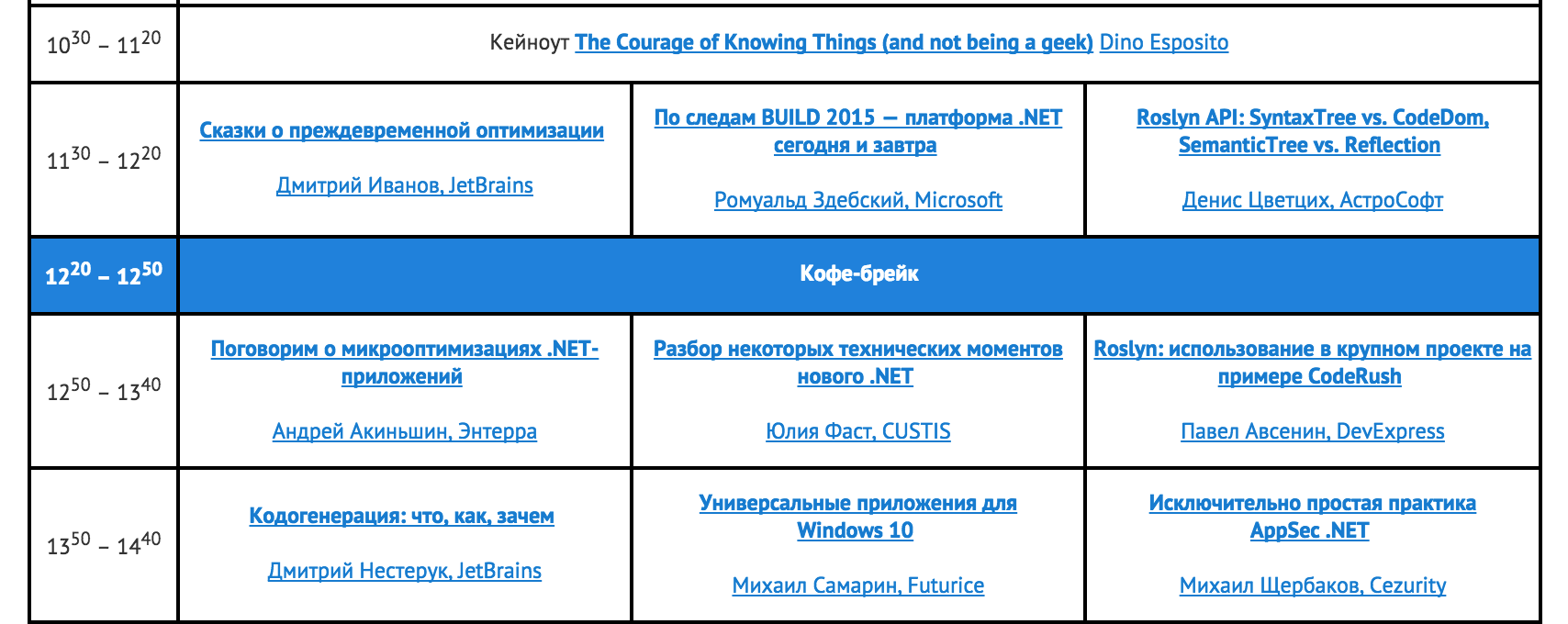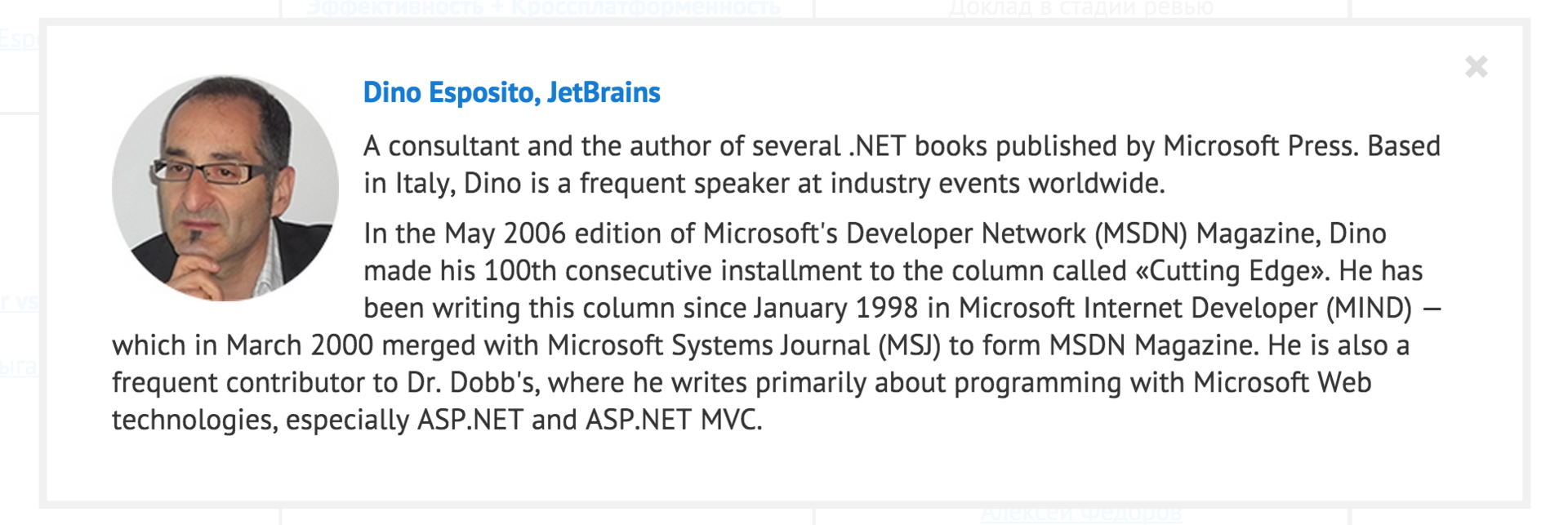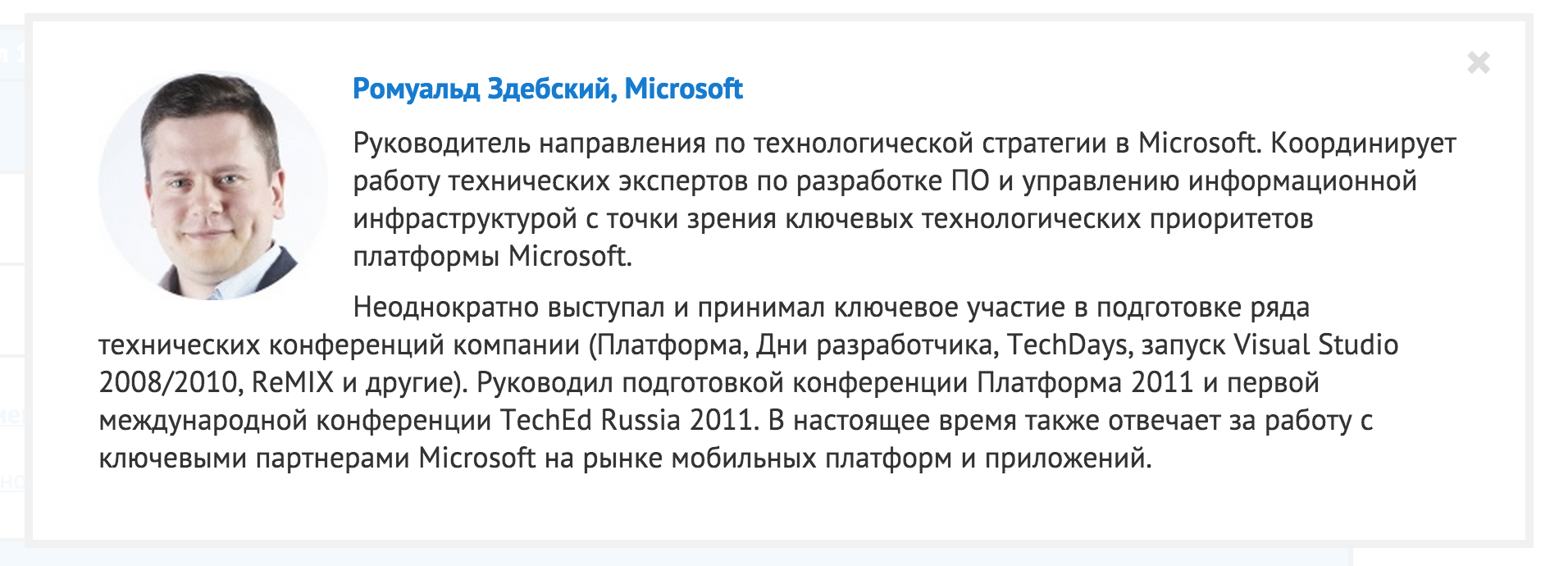.NET-conference. NEXT 2015 Piter: A short tour of the reports - part 1
Before the next St. Petersburg conference. NEXT literally remained a couple of weeks . Today I will do a traditional review of the reports. Or rather, half of them. We will go along the timeline, moving along the program from the opening fence to the dinner.

10:00 - 10:25 - Opening of the conference
The traditional format of the conference begins with the “opening ceremony”. The organizers (usually me and real_ales , less often the jetliner ) will greet the participants (you) and designate the main points: the format of the conference, the device of the site, what to expect from and what to hope for.
')
After our five minutes, the word goes to the sponsors, who talk about how cool they are and, most mysterious for me, why they are sponsoring .NEXT. In principle, everything is clear with them - Mikhail Samarin from Finnish Futurice will briefly tell how cool it is to work for them in Helsinki for the world's largest brands, and the guys from JetBrains (usually this mezastel ) will add a few words to the story of career opportunities their wonderful tulah.
10:30 - 11:20: Dino Esposito - The Courage of Knowing Things (and not being a geek)

Some abstracts from the announcement:
I have my own thoughts on the topic of who is such a good developer, who is such a geek, etc., I have repeatedly shared them on Habré. It is wildly interesting to me that this is why Dino thinks about it, and therefore I will definitely go to the opening report.
It is important to understand that keynout is also keynout in Africa, especially from Dino. Someone will surely once again swear, they say "one water, no specifics." Do not worry, this very specifics further in the course for will be so much that it will not seem a little.
Let's move to the first slot with reports: 10:30 - 11:20 .
Dmitry Ivanov, JetBrains - Tales of Premature Optimization

There is such a common thesis that premature optimization is the root of all evil. However, in the past .NEXT I only heard from the guys from Resharper: performance, performance, and performance. Sometimes it seems that they are just about performance and think.
Discussing this problem a month ago with Dima Ivanov, we came to the conclusion that you can still draw a certain discriminatory line and highlight, on the one hand, some classes of optimizations that can be done immediately, and on the other hand, those classes of optimizations that benefit from it is necessary to check specifically in runtime. Well, the report itself, respectively, is largely about finding some balance between these two extremes.
Roman Zdebsky, Microsoft - In the wake of BUILD 2015 - .NET platform today and tomorrow

BUILD, the annual developer conference from Microsoft, took place three weeks ago in Calyphonia. And of course, most of it was devoted to the present and future .NET-technologies. In his report, Roman will talk about new developments in the .NET world, about the directions in which the .NET ecosystem is developing, and about trends in each such direction.
Denis Cvetzich, AstroSoft - Roslyn API: SyntaxTree vs. CodeDom, SemanticTree vs. Reflection

Solving the task of generating client code for a SOAP service under Windows Phone 8.1, Denis and his colleagues tried two bundles for analyzing and generating code:
In the report, Denis will compare these approaches and share conclusions about what is best and how to deal with the shortcomings of each approach. But by the way, and a link to the project githab .
After a half-hour coffee break, the participants will disperse according to the reports of the following slot: 12:50 - 13:40 .
Andrei DreamWalker Akinshin, Enterra - Let's talk about micro-optimizations of .NET applications

Andrei is a famous writer on Habré, a researcher of dotnetovsky runtime and a picking compiler. The report, respectively, is aimed at the same steppe: a lot of low-level pieces, an assembler, differences in the code generated by different JIT compilers, and other dissected blood-guts. On the sweet - talk about the right and wrong benchmarks. Hey, Shipilev, come to us in Peter to troll Akinshina, huh?
Julia Fast, CUSTIS - Analysis of some technical aspects of the new .NET

In her review Julia will touch on several new products, among them: VS 2015, new in GC, EF7 and new ASP.NET. As Yulia herself writes, the report contains many small and not so “buns” of the new .NET world and is designed for those who want, but do not have time to follow all the news.
Pavel Avsenin, DevExpress - Roslyn: use in a large project on the example of CodeRush

Lovers of "practice" and opponents of "water" is dedicated. Report on the intricacies of moving a large project to Roslyn: what, how, why, what problems got. Overview of what Roslyn can give us and what can't, plus many examples of use in a variety of features.
And finally, the last slot in this review 13:50 –14: 40 .
Dmitry mezastel Nesteruk, JetBrains - Code Generation: What, How, Why

In this report, Dima will try to dispel the current myths associated with code generation. In the first part, Dima will make some review of the current state of affairs in the industry, and towards the end, he dreams together with the audience about the beautiful bright (and maybe dark?) Future when the programs are written by robots.
More specifically, students will learn about how code generation is used in the modern world, and about typical tasks that code generation solves. It will be shown how and why code generators are created, what approaches to this task exist, and how deep the rabbit hole goes in terms of nested realities of code generation. As they say, people are divided into two types: those who know what recursion is and those who know that people are divided into two types ...
Mikhail Samarin, Futurice - Universal applications for Windows 10

Microsoft has been moving for a long time towards some unification of everything they do in dotnet. And he says that Win10 and the new .NET really help writing universal code.
But is a C # programmer really able to cover all Windows 10 platforms with a single code? Mikhail will consider the Microsoft One promise with practical examples: “One package, One binary, One API surface, One Platform” and together with the listeners will try to conclude when this is the case and when it isn’t.
Mikhail Scherbakov, Cezurity - The Exceptionally Simple AppSec .NET Practice

The report will discuss the practical component of the Application Security domain for .NET developers. There will be considered numerous examples of vulnerable code that demonstrate weaknesses (weaknesses) that allow an attacker to break the security of the system using various types of attacks: XSS, CSRF, Session Fixation, attacks on business logic vulnerabilities, etc.
How to prevent such flaws from appearing in the code and eliminate the existing ones, why the Entity Framework does not protect against SQL Injection attacks, validation of requests from XSS, and XmlReader from XML-specific attacks? Answers to these and many other questions will be given in the course of this report.
That's all for today. A full grid and detailed descriptions of the reports can be found on the conference website .

10:00 - 10:25 - Opening of the conference
The traditional format of the conference begins with the “opening ceremony”. The organizers (usually me and real_ales , less often the jetliner ) will greet the participants (you) and designate the main points: the format of the conference, the device of the site, what to expect from and what to hope for.
')
After our five minutes, the word goes to the sponsors, who talk about how cool they are and
10:30 - 11:20: Dino Esposito - The Courage of Knowing Things (and not being a geek)

Some abstracts from the announcement:
- What are the criteria for a product being outdated?
- What is “being a geek” and what is “behaving like a geek”?
- What gives the developer a broad outlook?
- What useful can advise us Dinov grandmother?
I have my own thoughts on the topic of who is such a good developer, who is such a geek, etc., I have repeatedly shared them on Habré. It is wildly interesting to me that this is why Dino thinks about it, and therefore I will definitely go to the opening report.
It is important to understand that keynout is also keynout in Africa, especially from Dino. Someone will surely once again swear, they say "one water, no specifics." Do not worry, this very specifics further in the course for will be so much that it will not seem a little.
Let's move to the first slot with reports: 10:30 - 11:20 .
Dmitry Ivanov, JetBrains - Tales of Premature Optimization

There is such a common thesis that premature optimization is the root of all evil. However, in the past .NEXT I only heard from the guys from Resharper: performance, performance, and performance. Sometimes it seems that they are just about performance and think.
Discussing this problem a month ago with Dima Ivanov, we came to the conclusion that you can still draw a certain discriminatory line and highlight, on the one hand, some classes of optimizations that can be done immediately, and on the other hand, those classes of optimizations that benefit from it is necessary to check specifically in runtime. Well, the report itself, respectively, is largely about finding some balance between these two extremes.
Roman Zdebsky, Microsoft - In the wake of BUILD 2015 - .NET platform today and tomorrow

BUILD, the annual developer conference from Microsoft, took place three weeks ago in Calyphonia. And of course, most of it was devoted to the present and future .NET-technologies. In his report, Roman will talk about new developments in the .NET world, about the directions in which the .NET ecosystem is developing, and about trends in each such direction.
Denis Cvetzich, AstroSoft - Roslyn API: SyntaxTree vs. CodeDom, SemanticTree vs. Reflection

Solving the task of generating client code for a SOAP service under Windows Phone 8.1, Denis and his colleagues tried two bundles for analyzing and generating code:
- Reflection + CodeDom
- SemanticTree + SyntaxTree
In the report, Denis will compare these approaches and share conclusions about what is best and how to deal with the shortcomings of each approach. But by the way, and a link to the project githab .
This is the first of a series of reports of this conference, in the title of which Roslyn somehow appears. And this is one of the main trends of our conference. If several months ago there was no speaker about Roslin, then today we received 6 applications for Roslin reports, half of which we had to reject, so as not to turn the .NEXT into a Roslyn conference.
After a half-hour coffee break, the participants will disperse according to the reports of the following slot: 12:50 - 13:40 .
Andrei DreamWalker Akinshin, Enterra - Let's talk about micro-optimizations of .NET applications

Andrei is a famous writer on Habré, a researcher of dotnetovsky runtime and a picking compiler. The report, respectively, is aimed at the same steppe: a lot of low-level pieces, an assembler, differences in the code generated by different JIT compilers, and other dissected blood-guts. On the sweet - talk about the right and wrong benchmarks. Hey, Shipilev, come to us in Peter to troll Akinshina, huh?
Julia Fast, CUSTIS - Analysis of some technical aspects of the new .NET

In her review Julia will touch on several new products, among them: VS 2015, new in GC, EF7 and new ASP.NET. As Yulia herself writes, the report contains many small and not so “buns” of the new .NET world and is designed for those who want, but do not have time to follow all the news.
Pavel Avsenin, DevExpress - Roslyn: use in a large project on the example of CodeRush

Lovers of "practice" and opponents of "water" is dedicated. Report on the intricacies of moving a large project to Roslyn: what, how, why, what problems got. Overview of what Roslyn can give us and what can't, plus many examples of use in a variety of features.
And finally, the last slot in this review 13:50 –14: 40 .
Dmitry mezastel Nesteruk, JetBrains - Code Generation: What, How, Why

In this report, Dima will try to dispel the current myths associated with code generation. In the first part, Dima will make some review of the current state of affairs in the industry, and towards the end, he dreams together with the audience about the beautiful bright (and maybe dark?) Future when the programs are written by robots.
More specifically, students will learn about how code generation is used in the modern world, and about typical tasks that code generation solves. It will be shown how and why code generators are created, what approaches to this task exist, and how deep the rabbit hole goes in terms of nested realities of code generation. As they say, people are divided into two types: those who know what recursion is and those who know that people are divided into two types ...
Mikhail Samarin, Futurice - Universal applications for Windows 10

Microsoft has been moving for a long time towards some unification of everything they do in dotnet. And he says that Win10 and the new .NET really help writing universal code.
But is a C # programmer really able to cover all Windows 10 platforms with a single code? Mikhail will consider the Microsoft One promise with practical examples: “One package, One binary, One API surface, One Platform” and together with the listeners will try to conclude when this is the case and when it isn’t.
Mikhail Scherbakov, Cezurity - The Exceptionally Simple AppSec .NET Practice

I am deeply convinced that modern programmers pay less attention to the security of the applications they develop than they should. Such is the industry, such are the modern tools, approaches and principles. And the more pleasant to see in our program a report on Application Security.
The report will discuss the practical component of the Application Security domain for .NET developers. There will be considered numerous examples of vulnerable code that demonstrate weaknesses (weaknesses) that allow an attacker to break the security of the system using various types of attacks: XSS, CSRF, Session Fixation, attacks on business logic vulnerabilities, etc.
How to prevent such flaws from appearing in the code and eliminate the existing ones, why the Entity Framework does not protect against SQL Injection attacks, validation of requests from XSS, and XmlReader from XML-specific attacks? Answers to these and many other questions will be given in the course of this report.
That's all for today. A full grid and detailed descriptions of the reports can be found on the conference website .
Source: https://habr.com/ru/post/258429/
All Articles